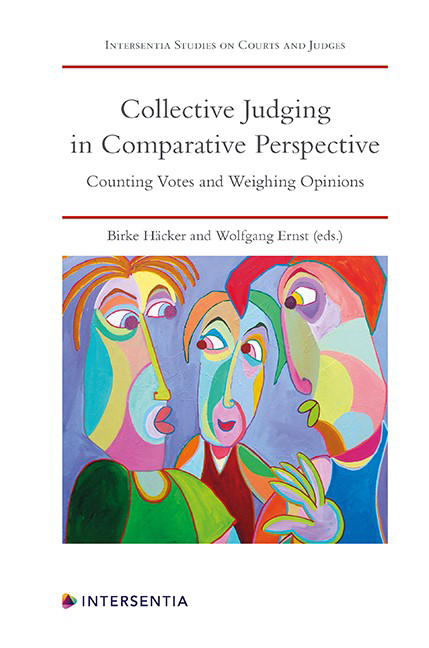Book contents
- Frontmatter
- Preface
- Contents
- List of Cases
- List of Contributors
- PART I DESIGNING COLLEGIATE COURTS’DECISION-MAKING PROCESSES
- PART II COLLEGIATE COURTS IN THE COMMON LAW TRADITION
- PART III COLLEGIATE COURTS IN THE EUROPEAN CIVIL LAW TRADITION
- PART IV COLLEGIATE COURTS IN A NON-EUROPEAN CIVIL LAW JURISDICTION: THE CASE OF JAPAN
- PART V SUPRANATIONAL AND INTERNATIONAL COLLEGIATE COURTS
- PART VI VOICES FROM THE AUDIENCE AND CLOSING REMARKS
- About the Editors
Chapter 16 - Decision-Making by the Boards of Appeal of the European Patent Office
Published online by Cambridge University Press: 09 February 2021
- Frontmatter
- Preface
- Contents
- List of Cases
- List of Contributors
- PART I DESIGNING COLLEGIATE COURTS’DECISION-MAKING PROCESSES
- PART II COLLEGIATE COURTS IN THE COMMON LAW TRADITION
- PART III COLLEGIATE COURTS IN THE EUROPEAN CIVIL LAW TRADITION
- PART IV COLLEGIATE COURTS IN A NON-EUROPEAN CIVIL LAW JURISDICTION: THE CASE OF JAPAN
- PART V SUPRANATIONAL AND INTERNATIONAL COLLEGIATE COURTS
- PART VI VOICES FROM THE AUDIENCE AND CLOSING REMARKS
- About the Editors
Summary
INTRODUCTION
The 1973 European Patent Convention (EPC) established a system for the grant of ‘European‘ patents, such patents extending in scope throughout the territories of its Contracting States (or those of them which the applicant has designated). Upon grant, a European patent takes effect as a bundle of national patents, each being enforceable by national law in the state for which it was designated. The system of law established by the EPC is both independent of national legal systems and autonomous. Its institutions and proceedings are not connected with those of the European Union, and the Contracting States include states that are not members of the EU. There are presently 38 such states.
Although, as with any patent granting authority, the system may have some failings, in general terms the EPC has been an outstanding success, measured not just by the large number of Contracting States. Thus in 2019 there were over 181,000 applications for a European patent, and nearly 138,000 were granted.
The European Patent Office (EPO) is the organisation charged with carrying out the aims of the EPC. It is subject to the overall control of an Administrative Council, composed of representatives from the Contracting States. The day-to-day running of the EPO is the responsibility of its President, who is in turn answerable to the Administrative Council.
The EPO has two core functions, carried out by two separate administrative departments or ‘Divisions‘ : first, the granting of European patents by the ‘Examining Division’ ; second, following a request filed by an ‘opponent‘, the revocation or amendment by the ‘Opposition Division’ of European patents in cases where it is established that the granted patent does not in fact comply with the EPC. There is no restriction on the national identity of those who may apply for a patent or file an opposition. Questions of infringement of a European patent are not dealt with by the EPO, but by national courts.
The fundamental principles for the grant and revocation/amendment of European patents are laid down in the EPC itself; more detailed, regulatory provisions are provided by Implementing Regulations.
- Type
- Chapter
- Information
- Collective Judging in Comparative PerspectiveCounting Votes and Weighing Opinions, pp. 293 - 302Publisher: IntersentiaPrint publication year: 2020



